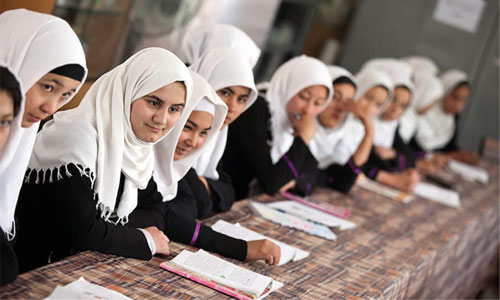The Islamic Emirate of Afghanistan’s spokesman Zabihullah Mujahid said on Thursday that the concerns, noted by the Organization of Islamic Cooperation (OIC) regarding the prohibition of women’s education, was understandable and that this was just a “temporary step” until the problem is resolved.
Mujahid said in a statement that the IEA appreciated the fact that the OIC called the meeting and said, “indeed the countries should continue to help the people of Afghanistan and no country should interfere in the internal affairs of Afghanistan.”
“The Islamic Emirate requests all organizations, especially the OIC, to have a close understanding with the new government of Afghanistan,” the statement read.
This comes after the Executive Committee of the OIC met on Wednesday in Jeddah, Saudi Arabia, to discuss the situation in Afghanistan.
According to a statement issued by the committee after the meeting, the OIC convened the extraordinary meeting to discuss the situation in Afghanistan “following the decisions taken by the de facto Afghan authorities to close down schools and universities to girls and women for an unspecified period and suspend women from working in all national and international non-governmental organizations (NGOs).
The organization said this was “in violation of the purposes of Islamic law and the methodology of the Messenger of Allah, Prophet Muhammad – May Allah’s peace and blessings be upon Him.”
The committee noted the “deteriorating humanitarian, social, economic, and human rights conditions in Afghanistan”.
They also said women and girls have the right “to access all levels of education, including university level,” adding that this “is a fundamental right in keeping with the teachings of the noble Islamic shariah.”
The committee also underscored the need to steer all efforts towards achieving Afghanistan’s development and the welfare of its people and reaffirmed its solidarity with the people of Afghanistan, and the commitment to help them establish peace, security, stability and development.
In addition, they welcomed efforts by the OIC General Secretariat, the Special Envoy of the OIC Secretary General to Afghanistan, and the International Islamic Fiqh Academy (IIFA) in engaging with the IEA authorities on issues of vital importance, “in accordance with the noble Islamic principles and values and relevant OIC resolutions”.
Among other statements, the OIC called for a second visit of the delegation of Muslim scholars to be arranged to engage with the highest officials of Afghanistan and again emphasized that education is a fundamental human right which all individuals must enjoy on the basis of equal opportunity and in a non-discriminatory manner, and not be deprived of.
The committee also expressed its “disappointment over the suspension of female education in Afghanistan and the decision ordering all national and international non-governmental organizations (NGOs) to suspend female employees until further notice,” adding that it urges the IEA to “adhere to the principles and purposes of the Charter of the United Nations and the OIC Charter, and to abide by its obligations under international treaties and agreements, including their obligations under international human rights covenants, particularly regarding the rights of women, children, youth, the elderly and people with special needs.”
The statement went on to note that the OIC calls on the IEA to strive towards reopening schools and universities for girls and enable them to enroll in all levels of education and all specializations required by the Afghan people while it also underscored “the need to protect fundamental rights, including the right to life, security, dignity and the right to education for all Afghan women and girls in accordance with Islamic values and universal human rights standards.”—Arioana news










